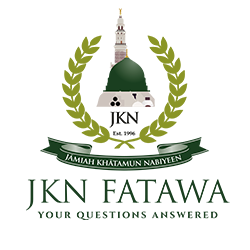9th May 2016
السلام عليكم و رحمة الله و بركاته
Question: As a medical student, part of the course syllabus in universities is to examine human organs of dead bodies, who consented to the use of their organs for medical research after their demise. As a Muslim student, are we permitted in the Shari’ah to examine the human organs and also dead bodies for medical research?
الجواب حامداً و مصلياً
In the name of Allāh, the Most Gracious, the Most Merciful
Answer
There is a real need for Muslims to get into the medical profession. Great Muslim surgeons and doctors are known to have existed during the Islamic medieval period. As well as Islamic knowledge, worldly knowledge that serves the best interest for the Muslim community is essential. This includes the need for Muslim medical practitioners who appreciate Islamic values that can cater for the Muslim community’s needs.
However, due to the intricacy of the issue some preliminary principles are explained to widen the understanding around the issue. The underpinning principle to note is that in the Sharī’ah, a human body whether in the form of living or dead is highly dignified that bears many rights. It’s dignity is understood from a prophetic tradition wherein the Messenger of Allāh sallallahu alayhi wasallam said, ‘Breaking the bone of the dead is tantamount to breaking the bone of the living.’[1] Hadeeth masters such as Hafiz ibn Hajr al-Asqalāni rahimahullah deduce from this that the dignity of the dead remains the same as if it was living, hence, its defilement even when it is dead is prohibited.[2] The Shari’ah requirement is that the body must be buried immediately after its demise and should not be objectified as a tool for one’s personal wishes or experiment. On this basis, the classical scholars forbade certain things like procuring (unnecessary) benefit from other human organs assuming it to be a defilement of the bodily dignity.[3]
On the other hand, the Sharī’ah is a religion of mercy and takes social circumstances and genuine necessity into consideration when following the legal principles proves extremely difficult in specific situations. In spite of forbidding the consumption of swine, the Holy Qur’ān permits eating it in situations of extreme duress provided that this is the only available animal for consumption. Furthermore, the classical jurists have allowed dissecting the dead body in cases of dire necessity such as performing a cesarean operation on a dead woman to extract the neonate (infant) when the neonate’s living is confirmed with certainty. [4] The jurists justify this through the legal maxim of choosing the lesser of the two harms, in that, dissecting the corpse of a woman to save the neonate’s life is a lesser harm than leaving it to die inside. This case example also conforms to the general Islamic principle of prohibited things become permitted in cases of genuine necessity, thus, human dissection is prohibited on a general scale but allowed in instances that serves the interests of a living human.
Once the above is understood, the issue at hand becomes clear. My general enquiry from reliable Muslim doctors confirms that medical students are obliged to attend sessions and sit in exams that involve dissecting the human body. If they don’t participate in those sessions then they cannot qualify as professional doctors which will ensue a greater loss for the Muslim community at large if there are no Muslim doctors. Contemporary scholars have allowed Muslim medical students to dissect human dead bodies to examine organs during unavoidable occasions.[5] This is justified on the basis of genuine necessity as well as public welfare that is, tolerating the smaller harm of experimenting on dead bodies to prevent the greater harm of having no qualified Muslim doctors in the society. This general concession must be accompanied with the following conditions;
- Obtained prior permission from the deceased or his/her heirs for experimental purposes.
- Experiment must be carried out in a manner where the dead body is not treated in an undignified manner.
- To avoid looking at the awrah (private parts) of the dead body as much as possible especially those that causes arousal but if impossible, then to limit the viewing of the private parts only to the bear necessity.
- Any body parts not required for experimentation should be buried.
[Allãh Knows Best]
Written by (Mufti) Abdul Waheed
Answer Attested by Shaykh Mufti Saiful Islam
JKN Fatawa Department
[1] Sunna Abu Dawood No 3207, Kitabul Janaiz, Hadeeth no: 3207
عَنْ عَائِشَةَ، أَنَّ رَسُولَ اللَّهِ صَلَّى اللهُ عَلَيْهِ وَسَلَّمَ قَالَ:كَسْرُ عَظْمِ الْمَيِّتِ كَكَسْرِهِ حَيًّا
[2] Ibn Hajr, Fathul Bhari, Bāb Kathratun Nisā p. 113 vol 9
وَيُسْتَفَادُ مِنْهُ أَنَّ حُرْمَةَ الْمُؤْمِنِ بَعْدَ مَوْتِهِ بَاقِيَةٌ كَمَا كَانَتْ فِي حَيَاتِهِ وَفِيهِ حَدِيثُ كَسْرِ عَظْمِ الْمُؤْمِنِ مَيِّتًا كَكَسْرِهِ حَيًّا أَخْرَجَهُ أَبُو دَاوُدَ وبن ماجة وَصَححهُ بن حِبَّانِ
[3] Fatawa Hindiyyah, Book of Karahiyya, p. 434 vol 5
لِانْتِفَاعُ بِأَجْزَاءِ الْآدَمِيِّ لَمْ يَجُزْ قِيلَ لِلنَّجَاسَةِ وَقِيلَ لِلْكَرَامَةِ هُوَ الصَّحِيحُ
Ibn Nujaym, al-Bahrur Raiq, vol. 6, p. 133.
(قَوْلُهُ وَشَعْرِ الْإِنْسَانِ وَالِانْتِفَاعِ بِهِ) أَيْ لَمْ يَجُزْ بَيْعُهُ وَالِانْتِفَاعُ بِهِ لِأَنَّ الْآدَمِيَّ مُكَرَّمٌ غَيْرُ مُبْتَذَلٍ فَلَا يَجُوزُ أَنْ يَكُونَ شَيْءٌ مِنْ أَجْزَائِهِ مُهَانًا مُبْتَذَلًا
[4] Fatawa Hindiyyah, Book of Karahiyya, Bāb Fima Yasa’u min Jarahāt Bani Ādam p. 440 vol 5
فِي فَتَاوَى أَبِي اللَّيْثِ – رَحِمَهُ اللَّهُ تَعَالَى – فِي امْرَأَةٍ حَامِلٍ مَاتَتْ وَعُلِمَ أَنَّ مَا فِي بَطْنِهَا حَيٌّ فَإِنَّهُ يَشُقُّ بَطْنَهَا مِنْ الشِّقِّ الْأَيْسَرِ وَكَذَلِكَ إذَا كَانَ أَكْبَرُ رَأْيِهِمْ أَنَّهُ حَيٌّ يَشُقُّ بَطْنَهَا كَذَا فِي الْمُحِيطِ
Badai. Sanai, Kitabul Isthsan p. 130 vol 5
حَامِلٌ مَاتَتْ فَاضْطَرَبَ فِي بَطْنِهَا وَلَدٌ فَإِنْ كَانَ فِي أَكْبَرِ الرَّأْيِ أَنَّهُ حَيٌّ يُشَقُّ بَطْنُهَا لِأَنَّا اُبْتُلِينَا بِبَلِيَّتَيْنِ فَنَخْتَارُ أَهْوَنَهُمَا وَشَقُّ بَطْنِ الْأُمِّ الْمَيِّتَةِ أَهْوَنُ مِنْ إهْلَاكِ الْوَلَدِ الْحَيِّ.
[5] Az-Zuhaili Fiqhul Islami wa addilathu p. 440 vol 9
يجوز التشريح عند الضرورة أو الحاجة بقصد التعليم لأغراض طبية، أو لمعرفة سبب الوفاة وإثبات الجناية على المتهم بالقتل ونحو ذلك لأغراض جنائية إذا توقف عليها الوصول إلى الحق في أمر الجناية، للأدلة الدالة على وجوب العدل في الأحكام

